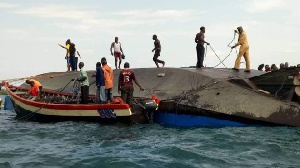Lake Victoria is bringing ashore more trouble for residents and business owners than ever before.
Scientists have for decades warned of the impact of climate variability like the current increased rainfall that is unusual.
The impact is being felt, especially around Lake Victoria which is shared by Uganda, Kenya and Tanzania.
"The level is going up. We cannot stop the water. We can only manage it at Jinja. Move to other areas if you are near the shores. Because even Lakes Kyoga, Albert and River Nile, the water levels are also increasing as we release the water from Jinja," Dr Callist Tindimugaya, the commissioner for water resources planning and regulation at the Ministry of Water and Environment, said.
"It is eroding shorelines, altering ecosystems and causing flooding and economic damage," Prof Raphael Kapiyo, an environmental scientist in Kenya, told the Standard Media.
In Mwanza, the port city of Tanzania, the communities at the shores are equally worried.
A fisherman told Mwanainchi newspaper that they need an explanation from experts why the water levels have continued to increase since the beginning of the year.
"Water has always been moving towards people's businesses around here. I have been here for 40 years, the case was different 20 years ago. It is very serious. Until one studies the situation keenly, it is very difficult to know what's going on," Mr John Masanja, a fisherman in Mwanza, said. In Uganda, Lake Victoria has only one outlet through the Owens Falls Dam in Jinja, but this is being affected by suds too, disrupting electricity generation at the dam.
On Sunday, President Museveni, in his address on updates about Covid-19, asked people who built or are cultivating along the Lake Victoria shores to vacate peacefully before the National Environment Management Authority (Nema) forces them out.
The lake bursting its shoreline appears a regional problem for the countries that share it.
In March, Kenya's Standard newspaper reported that: "Villagers were fleeing their homes following the rare natural phenomenon last witnessed in 1963. Their homes, livestock and farms have been swept away and some farms submerged. The rising water levels have also affected the lake's shoreline, sweeping through several beach hotels in Migori, Homa Bay, Kisumu and Siaya counties."
For more than four decades, environmentalists have been worried that water levels on the lake would decrease due to the construction of many hydropower dams such as Isimba on the River Nile downstream.
However, the reverse has happened, with torrential rains increasing the water levels and submerging many settlements and commercial settings along the shores which have had to adapt or relocate.
The world has always talked more about climate change than global warming.
Scientists describe climate variability as a change that occurs within smaller time frames such as a month, season or a year and climate change considers changes that occur over longer periods of time, for instance 30 years or more.
Most users of weather information are unable to tell whether this is a climate variability or climate change which activists have said the world has hurt nature by indiscriminate destruction of forests, reclaiming swamps or polluting air and water for economic gain.
At local beaches such as Lido, White Sand and Protea Hotel in Entebbe and Speke Resort Munyonyo, among others, their sandy shoreline has been submerged in water halting any holiday beach sporting activities.
Although the beach management declined to speak to Daily Monitor, the rise in water levels has affected them. Many guests had deserted the lakeside area and moved to the upper drier part of the premises.
KK Beach in Ggaba suburb has been submerged. There is no more beach sand, the kitchen, dining and pool table areas have all been submerged.
The water has moved forward about 35 metres beyond where it used to stop previously.
Mr Christopher Ahimbisibwe, the manager at Spenah Beach in Entebbe, said he can no longer boast of having sand at the beach.
Despite the slanting landscape, the water levels have continued to rise up to the beach sand. Even the watchtower for monitoring swimmers at the beach has been fully submerged. It now sits about 7 metres into the lake.
"The water level is continuing to rise and there is nothing I can do. One side of the wall at the protection zone has fallen into the water. Even after the lockdown, I don't know how we will continue the business. I am just home now, social distancing," Mr Ahimbisibwe said.
He asked the Meteorological Department to have a comprehensive forecast because they do not know how long the rain will continue.
Most parts of the East African region have continued to receive heavy rains from the Horn of Africa, Central Africa, Rwanda to DR Congo and Tanzania causing flooding in many areas.
Dr Tindimugaya said they are worried about safety of the hydro-electricity dam due to the moving suds or floating islands which have invaded the power generation dam along the River Nile.
Africa News of Wednesday, 22 April 2020
Source: allafrica.com

















